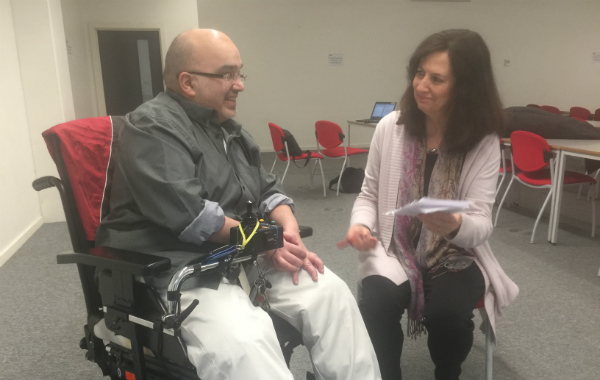
Dr Hamied Haroon was a participant on Result CIC’s first ‘Achieving Your Potential’ programme for disabled staff with disabilities at the University of Manchester in 2014. The programme will run for the fifth consecutive year in 2018. It focuses on enabling participants to increase their self-confidence and make best use of their talents and skills, including networking.
As well as his busy research role on using MRI to achieve earlier and more effective diagnosis of major diseases such as cancer and dementia, Hamied plays an important role in disability issues. Having been Chair and then Co-Chair of the University's Disabled Staff Network for 10 years, he saw the need for a network of networks so that DSNs in Higher Education could share good practice and support each other. He founded the National Association of Disabled Staff Networks in Higher Education in 2014. It now boasts members at 51 different universities.
Hamied has been invited to give a speech at Cambridge University's Annual Disability lecture in March. Last year I worked with Hamied to prepare a short keynote speech he was invited to give at a special reception for the Snowdon Trust at the House of Lords, and practice delivery of the speech. This is a type of coaching with a very specific aim – supporting the person to organise their ideas clearly and deliver them with impact.
I was delighted to be asked to work with Hamied on his new speech. When we had wrapped up the main material for the speech and Hamied had done a first practice, I asked him a few questions.
JC: How are you feeling about giving your speech in Cambridge?
HH: Absolutely petrified! Cambridge is one of the most prestigious universities in the world and to be invited there is pretty daunting. But also the other speakers are very high profile academics. I will be alongside two accomplished Professors. Gulp!
JC: I am sure many people feel the same way. Do you mind if I ask why you decided to have some coaching support to prepare your speech?
HH: Not at all. I think it is one thing to have some ideas for a speech but somehow it is quite a different thing to write them down – to kind of get the thoughts out. It makes a difference to be able to talk to someone about this process and if they can reflect back your ideas as you talk them out. There is a kind of magic created when that happens.
JC: Public speaking is said to be one of the things which scares people the most. Could you explain how the process of coaching to prepare for a speech works?
HH: Well the main thing is you get asked a lot of probing questions. If you have had coaching then this type of questioning will be familiar, but in this case your answers to the questions let you shape what you want to say: they allow you to tell the story around which the speech is based.
JC: Thank you. Finally, do you have any top tips please for people reading this?
HH: Yes. Think about when you are in the audience. You are not there to be critical of the speaker – you really want to hear what the speaker has to say. So why would it be different when you are the speaker? We tend to be so self-critical. When you get out there and start to hear the sound of your own voice, it gives a real rush! And it is a fantastic thing when you realise that the audience is getting that same feeling. It makes it all worthwhile!
JC: Thank you very much for the interview and though I am sure you don't need it, good luck for your speech at Cambridge!
HH: Thank YOU, Jane! You are awesome and my inspiration.